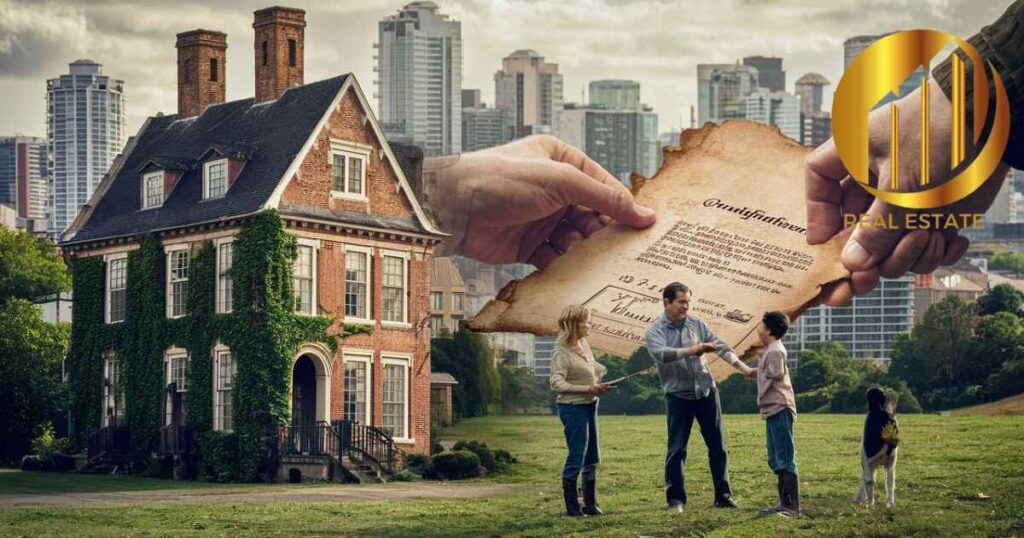In real estate, the term “Grandfathered” has a unique place. Many people have heard this legal word but only some fully understand it. It has to do with the perception that a property proprietorship is a decent and noble place to live.
Whatever the case, what does Grandfathered mean in real estate? And how can it help with the confusing web of drafting rules and land guidelines? We will go deeply into the concept of being “Grandfathered” in the land in this comprehensive guide, looking into its acceptable definitions, substantiated origins, and relevance in the ever-evolving landscape of the land today.
What are Some Examples of Grandfathered Clauses in Real Estate?

| Clause Type | Description |
| Zoning Restrictions | A property may have zoning restrictions that have changed over time. A grandfathered clause may allow the property to maintain its current land use despite new zoning regulations. |
| Building Codes | Changes in building codes may require upgrades or renovations to a property. A grandfathered clause can exempt the property from complying with new building code requirements. |
| Setback Conditions | The minimal distance that a building can have from nearby structures or property lines is specified by the setback standards. A grandfathered condition may allow an existing structure to maintain its current setback despite regulatory changes. |
| Land Use | Changes in land use regulations may restrict certain activities on a property. A grandfathered clause can allow the property to continue its existing land use despite new regulations. |
| Occupancy Limits | Regulations on the number of occupants in a dwelling may change over time. A grandfathered clause can permit a property to maintain its current occupancy limit despite new regulations. |
Provision for Grandfathering and the Legacy Clause

In real estate and legal contexts, grandfathering and legacy clauses let established businesses carry out allowed operations before the enactment of new laws or regulations. These exemptions may be one-time, ongoing, or subject to certain restrictions. Grandfathering usually pertains to circumstances in which extant activities are governed by outdated regulations, offering a transitional period for the adoption of new legislation.
A legacy clause in real estate for instance can spare a landowner from complying with new zoning requirements, preserving their property rights under earlier rules. These clauses, which are frequently provided for a certain time to promote compliance with new regulations, might give exempted companies a competitive advantage.
What Differences a Legacy Clause from a Grandfather Clause?
The application and context of grandfather clauses and legacy clauses within legal and regulatory systems are different. A grandfather clause often permits ongoing organizations or operations to operate under the previous restrictions. While the new ones take effect for cases in the future. This exception which maintains current procedures may be either temporary or permanent.
A legacy clause on the other hand sometimes allows parties to continue operating under the terms of earlier regulations rather than having to comply with the new ones at least temporarily. Legacy clauses ensure a transition period for compliance with updated regulations while keeping certain existing practices. They can be temporary or permanent with defined constraints.
Grandfathered Property Rights What Are They?

Grandfathered property rights in real estate relate to the rights or privileges that an existing landowner retains despite the implementation of new rules or legislation. These rights are frequently dependent on the zoning, land use, or building code status of the property at the time. Existing properties may be “grandfathered in,” or exempt from following new requirements, when they are adopted.
Consider the scenario where you are the owner of an older house in a residential area. New zoning regulations are introduced by the local government, requiring larger setbacks between structures and property lines. Because your house was built before these new rules were implemented, it might be “grandfathered” and permitted to stay close to property lines.
The Foundation of Grandfathered Rights in Law

The idea of “lawful use” or “lawfulness” serves as the foundation for grandfather rights in law. These expressions are ambiguous and suggest that a property is not bound by current land-use or zoning regulations, but may be used for any purpose as permitted by its pre-existing conditions.
Think over the following statement to gain a better understanding of ancestral property. On a campus that has been remodeled for residential usage, you own a company that was formerly a manufacturing factory. You as the business owner are still able to use the land for commercial use despite the new zoning rules.
Local Government Functions and the New Rules
The determination of whether properties are entitled to grandfathered rights is a crucial task for local governments. Different jurisdictions may have very different procedures for determining this. All local governments have to do is weigh property rights against public safety when determining whether an area should be grandfathered in.
Drafting mandates from the region are many times the wellspring of dynamic power. The standards and rules controlling area use in a particular region are framed in these local laws. These bylaws are frequently updated with newly proposed regulations. The next step is to evaluate existing properties to see if they meet the new standards or are grandfathered in.
Grandfathered Use in the Development of Real Estate

In the context of real estate development, grandfathered usage is the process by which properties that already exist are granted specific rights and benefits despite new laws. This idea makes sure that properties can be used in ways that the laws of today might otherwise prohibit. For instance in any event, when new guidelines call for changes like more prominent difficulties among structures and property limits
A property that is “grandfathered in” under present zoning laws can continue to use it as it does and enjoy its proximity rights. Inland advancement and grandfathered freedoms are fundamental since they give landowners security and coherence and empower them to keep up with their property worth and utilization privileges without expecting to follow all new regulations.
The Function of Skilled Real Estate Lawyers

Real Estate Lawyers with experience are expected to explore the intricacies of drafting rules, new guidelines, and grandfathered property privileges. These specialists can assist designers and landowners with exploring the intricacies of grandfathering provisos and legitimate non-adjusting use since they have an intensive comprehension of the overall set of laws.
Landowners looking for help with applying for required legitimate grants, deciding their qualification for grandfathered privileges, or getting basic direction on complying with new and current guidelines can all profit from the help of a specialist land regulation group. Having an accomplished lawyer on your side can have a significant effect in arriving at your land objectives and complying with the law. Whether you’re a singular mortgage holder or a land engineer.
What is the Process for Removing a Grandfathered Clause from a Property?
The precise conditions and legal criteria will determine how complicated and time-consuming it is to remove a grandfathered clause from a property. Generally grandfathered rights are safeguarded to provide continuity under previous laws for current property owners. These rights however may occasionally be restricted, controlled, or eliminated provided certain requirements are satisfied.
A grandfathered use, such as Compass Real Estate, for instance, could be withdrawn if it significantly jeopardizes public welfare, morality, safety, or health. Plus, local governments can set up rigorous guidelines that make it difficult for nonconforming uses to continue, or they can even design phases to phase out nonconforming activities. Although grandfathered rights are generally strong, they are not unaffected by regulations and may be restricted or revoked in some situations.
FAQ”s
Why is it Called Grandfathered?
It’s called “grandfathered” because it preserves existing privileges or exemptions, much like an inheritance passed down from one generation (“grandfather”) to the next.
Which Benefits Will Grandfathering Offer?
Benefits of grandfathering include protecting investments safeguarding property rights and preventing expensive changes.
How Long Does a Grandfather Clause Last?
A grandfather clause usually lasts for as long as the circumstances or conditions that make the exemption eligible continue to exist.
Conclusion
In real estate, the possibility of grandfathered property freedoms is fundamental to guaranteeing land owners’ progression and solidness even with evolving rules. These privileges bar existing properties from prompt consistency with new limitations, permitting them to partake in certain advantages under past regulations.
Grandfathered property freedoms have their starting points in authentic settings, for example, the American post-nationwide conflict time when they were first made to save specific individuals from severe democratic regulations. These privileges were developed to incorporate land use limitations and property responsibility, and they are currently a fundamental part of land regulation.
Although grandfathered property freedoms give proprietors of the property a feeling of safety and honor, they are dependent upon specific limitations and necessities, ensuring harmony between safeguarding current privileges and adjusting to changing lawful scenes in the land area.











